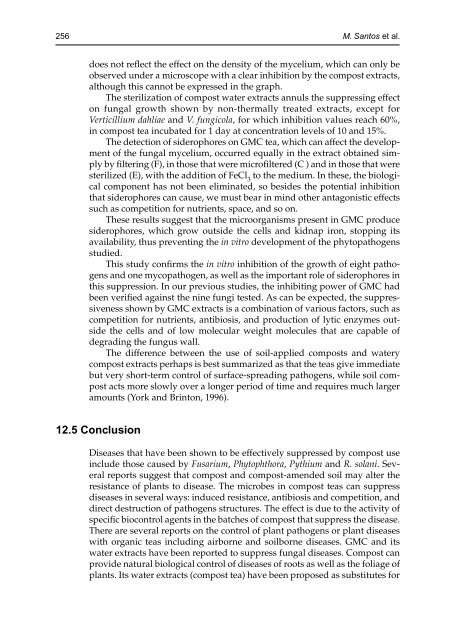natural-products-in-plant-pest-management
natural-products-in-plant-pest-management
natural-products-in-plant-pest-management
You also want an ePaper? Increase the reach of your titles
YUMPU automatically turns print PDFs into web optimized ePapers that Google loves.
256 M. Santos et al.does not reflect the effect on the density of the mycelium, which can only beobserved under a microscope with a clear <strong>in</strong>hibition by the compost extracts,although this cannot be expressed <strong>in</strong> the graph.The sterilization of compost water extracts annuls the suppress<strong>in</strong>g effecton fungal growth shown by non-thermally treated extracts, except forVerticillium dahliae and V. fungicola, for which <strong>in</strong>hibition values reach 60%,<strong>in</strong> compost tea <strong>in</strong>cubated for 1 day at concentration levels of 10 and 15%.The detection of siderophores on GMC tea, which can affect the developmentof the fungal mycelium, occurred equally <strong>in</strong> the extract obta<strong>in</strong>ed simplyby filter<strong>in</strong>g (F), <strong>in</strong> those that were microfiltered (C ) and <strong>in</strong> those that weresterilized (E), with the addition of FeCl 3to the medium. In these, the biologicalcomponent has not been elim<strong>in</strong>ated, so besides the potential <strong>in</strong>hibitionthat siderophores can cause, we must bear <strong>in</strong> m<strong>in</strong>d other antagonistic effectssuch as competition for nutrients, space, and so on.These results suggest that the microorganisms present <strong>in</strong> GMC producesiderophores, which grow outside the cells and kidnap iron, stopp<strong>in</strong>g itsavailability, thus prevent<strong>in</strong>g the <strong>in</strong> vitro development of the phytopathogensstudied.This study confirms the <strong>in</strong> vitro <strong>in</strong>hibition of the growth of eight pathogensand one mycopathogen, as well as the important role of siderophores <strong>in</strong>this suppression. In our previous studies, the <strong>in</strong>hibit<strong>in</strong>g power of GMC hadbeen verified aga<strong>in</strong>st the n<strong>in</strong>e fungi tested. As can be expected, the suppressivenessshown by GMC extracts is a comb<strong>in</strong>ation of various factors, such ascompetition for nutrients, antibiosis, and production of lytic enzymes outsidethe cells and of low molecular weight molecules that are capable ofdegrad<strong>in</strong>g the fungus wall.The difference between the use of soil-applied composts and waterycompost extracts perhaps is best summarized as that the teas give immediatebut very short-term control of surface-spread<strong>in</strong>g pathogens, while soil compostacts more slowly over a longer period of time and requires much largeramounts (York and Br<strong>in</strong>ton, 1996).12.5 ConclusionDiseases that have been shown to be effectively suppressed by compost use<strong>in</strong>clude those caused by Fusarium, Phytophthora, Pythium and R. solani. Severalreports suggest that compost and compost-amended soil may alter theresistance of <strong>plant</strong>s to disease. The microbes <strong>in</strong> compost teas can suppressdiseases <strong>in</strong> several ways: <strong>in</strong>duced resistance, antibiosis and competition, anddirect destruction of pathogens structures. The effect is due to the activity ofspecific biocontrol agents <strong>in</strong> the batches of compost that suppress the disease.There are several reports on the control of <strong>plant</strong> pathogens or <strong>plant</strong> diseaseswith organic teas <strong>in</strong>clud<strong>in</strong>g airborne and soilborne diseases. GMC and itswater extracts have been reported to suppress fungal diseases. Compost canprovide <strong>natural</strong> biological control of diseases of roots as well as the foliage of<strong>plant</strong>s. Its water extracts (compost tea) have been proposed as substitutes for


